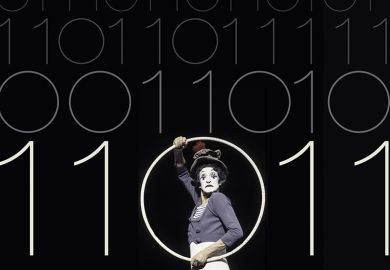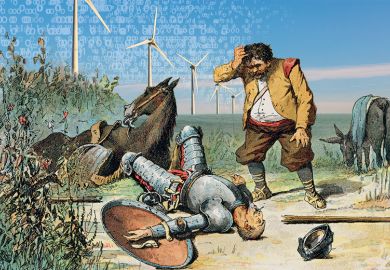Here's a popular story: Noam Chomsky revolutionised the study of linguistics, he has unrivalled authority within the field, and he has massively influenced other subjects from computer science to literary studies. His insights into language have also been central to his political activism, in which he regularly criticises mainstream journalism as deliberate propaganda. His opposition to the Vietnam conflict meant that he rejoiced when the US eventually lost the war, and his writings since then have been vehemently anti-American and anti-Israeli. During the 1970s, he refused to condemn the genocidal Pol Pot regime in Cambodia and flirted with Holocaust denial. More recently, he expressed doubt that the Serbian leader Slobodan Milosevic was responsible for massacres in Bosnia and Kosovo. His anarchist views have led him to support militant action (including violence) against state power and to oppose government bureaucracy as interfering with individual freedom.
There is one tiny problem with this story, in Captain Edmund Blackadder's memorable words: it is complete bollocks. Chomsky's generative grammar has always been a minority tendency within linguistics, and scholars in other fields have mostly either ignored his work or rejected it. There is no important connection between his linguistics and his political work: in fact, there are good reasons not to look for any. We'll return to the other untruths later: the point is that any book about Chomsky should be judged, in my view, on how effectively it dispels the myths that have grown up around him.
So how well does this one do? On the importance of Chomsky's linguistics and on the links between the linguistics and the politics, Robert Barsky scores poorly. The opening chapter says Chomsky "revolutionised" the study of language, and that this gave him the "credibility and credentials" to speak out in the political arena. The book switches repeatedly from Cartesian rationalism to political activism and back. Admittedly, some of Chomsky's finest partisans side with Barsky here: Carlos Otero has presented both sides of Chomsky's work together in many essays and edited volumes, and Jean Bricmont recently co-edited a large volume in French that does the same. Nonetheless, I think all of them do Chomsky a profound disservice. He has often played down the impact of his work within linguistics, and this is not modesty but realism. Among the areas of linguistics where the "Chomsky effect" is virtually nil are corpus analysis, cognitive linguistics, pragmatics and language engineering. The number of scholars (and journals, conferences and so on) in these areas is enormous compared with those following Chomsky's lead. Cast the net a little wider to include lexicography, translation studies, teaching English as a second language and speech therapy, and Chomsky's influence is still virtually nil.
Chomsky is often asked about the connections between his linguistics and his politics, and he invariably replies that they are insignificant, apart from generalities about the value of challenging established authority and received beliefs in both areas. His work on language has nothing to say about its misuse in the political sphere (for example, the way the word "terrorism" is usually limited to crimes by official enemies but not those committed by allies). He stresses repeatedly that linguistics requires special training and serious intellectual study, whereas social critique just requires simple scepticism and patient, often boring, organising. Anything that gives the impression that you need to know about generative linguistics to change the world is misconceived.
On most of the other myths, Barsky is far more helpful. Working backwards through my initial paragraph: anarchism is presented extensively and thoughtfully, with much discussion of Rudolf Rocker's neglected masterpiece, Nationalism and Culture, and other precursors of Chomsky's distinctive views. In 2004, Chomsky advised people to vote for John Kerry in order to deny George W. Bush a second term in office: coming from an anarchist, this astonished many people, so it is a pity that Barsky ignores that particular controversy. In fact, Chomsky has often encouraged people to vote when it makes sense to do so: elected politicians are at least partly accountable for their actions, as opposed to the corporate elite, who operate mostly in secret.
Barsky also passes over Kosovo, widely regarded even among progressives in the US and Europe as a successful humanitarian intervention - in defiance of the facts, as Chomsky has repeatedly argued. Chomsky also denounced the war crimes trial of Milosevic as a farce, again in defiance of much left- wing opinion - another missed opportunity for Barsky to set the record straight. On genocide in Cambodia, Barsky is very thorough, however. Chomsky never denied that the Khmer Rouge massacred many people: his point was that Pol Pot was held up in the West as the epitome of evil, while the previous slaughter of hundreds of thousands of Cambodians by US bombing was not - and nor was the concurrent killing of similar numbers of people in East Timor. In these other two cases, action by the US could have prevented or mitigated the carnage, whereas arguments about Pol Pot after his regime fell - which is when Chomsky wrote about it - could not help the victims one iota.
The crucial fact about Chomsky and Holocaust denial, as Barsky makes clear, is that a French professor, Robert Faurisson, was threatened with prosecution in a criminal court for falsifying history (compare it with the case of David Irving, who was recently prosecuted and imprisoned in Austria on similar charges). I dislike Faurisson and Irving intensely, but I agree with Chomsky that allowing the state to determine historical truth is both morally wrong and (for any progressive person) tactically stupid: it opens the door for the establishment to clamp down on dissidents of all kinds.
Much of this book is valuable and instructive, and the insights into Chomsky as a person, notably in the many extracts from his correspondence and remarks by friends and colleagues, are fascinating. I still think, though, that the linguistics should have been dealt with elsewhere.
Raphael Salkie is professor of language studies at Brighton University.
The Chomsky Effect: A Radical Works beyond the Ivory Tower
Author - Robert Barsky
Publisher - MIT Press
Pages - 416
Price - £17.95
ISBN - 9780262026246
Register to continue
Why register?
- Registration is free and only takes a moment
- Once registered, you can read 3 articles a month
- Sign up for our newsletter
Subscribe
Or subscribe for unlimited access to:
- Unlimited access to news, views, insights & reviews
- Digital editions
- Digital access to THE’s university and college rankings analysis
Already registered or a current subscriber? Login



